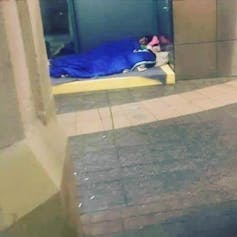
Jacki Montgomery, Western Sydney University; Aila Khan, Western Sydney University, and Louise Carley Young, Western Sydney University
Increasing numbers of women lack a safe and secure place to call home. But most women who are homeless are “invisible”. You don’t see these vulnerable women sleeping on the streets – most are forced into “couch-surfing”, staying in crisis or temporary accommodation, or sleeping in their cars.
We interviewed past participants in the Vinnies CEO Sleepout and people who have experienced homelessness. The stories of women who are homeless highlight the many forms that homelessness and the attendant vulnerability can take.
The most frequent cause of their homelessness is family violence. From 2015-2017, the number of women hospitalised due to partner assault rose by 23%. In Australia, one woman is killed by a current or previous partner every nine days. A woman is hospitalised because of domestic violence every two hours.


